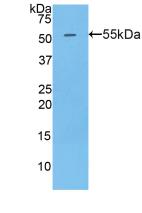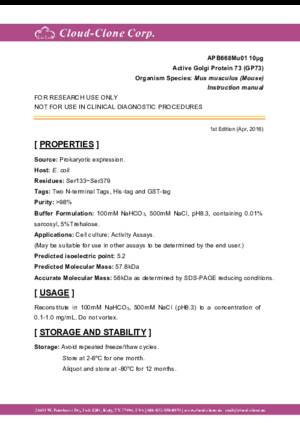Active Golgi Phosphoprotein 2 (GOLPH2)
GOLM1; GP73; C9orf155; Golgi Membrane Protein 1; Golgi Protein 73
- Product No.APB668Mu01
- Organism SpeciesMus musculus (Mouse) Same name, Different species.
- Buffer Formulation20mM Tris, 150mM NaCl, pH8.0, containing 1mM EDTA, 1mM DTT, 0.01% SKL, 5% Trehalose and Proclin300.
- Traits Freeze-dried powder
- Purity> 97%
- Isoelectric Point5.2
- ApplicationsCell culture; Activity Assays.
- DownloadInstruction Manual
- UOM 10µg50µg 200µg 1mg 5mg
- FOB
US$ 380
US$ 950
US$ 1900
US$ 5700
US$ 14250
For more details, please contact local distributors!
ACTIVITY TEST

Golgi Protein 73 (GP73) also known as Golgi phosphoprotein 2 or Golgi membrane protein GP73 is a protein that encoded by the GOLM1 gene. The Golgi complex plays a key role in the sorting and modification of proteins exported from the endoplasmic reticulum. It has been observed to be upregulated in response to viral infection. Besides, Dymeclin (DYM) has been identified as an interactor of GP73, thus a binding ELISA assay was conducted to detect the interaction of recombinant mouse GP73 and recombinant human DYM. Briefly, GP73 were diluted serially in PBS, with 0.01% BSA (pH 7.4). Duplicate samples of 100uL were then transferred to DYM-coated microtiter wells and incubated for 2h at 37℃. Wells were washed with PBST and incubated for 1h with anti-GP73 pAb, then aspirated and washed 3 times. After incubation with HRP labelled secondary antibody, wells were aspirated and washed 3 times. With the addition of substrate solution, wells were incubated 15-25 minutes at 37℃. Finally, add 50µL stop solution to the wells and read at 450nm immediately. The binding activity of of GP73 and DYM was shown in Figure 1, and this effect was in a dose dependent manner.
USAGE
Reconstitute in 20mM Tris, 150mM NaCl (pH8.0) to a concentration of 0.1-1.0 mg/mL. Do not vortex.
STORAGE
Avoid repeated freeze/thaw cycles. Store at 2-8°C for one month. Aliquot and store at -80°C for 12 months.
STABILITY
The thermal stability is described by the loss rate. The loss rate was determined by accelerated thermal degradation test, that is, incubate the protein at 37°C for 48h, and no obvious degradation and precipitation were observed. The loss rate is less than 5% within the expiration date under appropriate storage condition.
GIVEAWAYS
INCREMENT SERVICES
-
 BCA Protein Quantification Kit
BCA Protein Quantification Kit
-
 Molecular Mass Marker for Protein
Molecular Mass Marker for Protein
-
 Monoclonal Antibody Customized Service
Monoclonal Antibody Customized Service
-
 Polyclonal Antibody Customized Service
Polyclonal Antibody Customized Service
-
 Protein Activity Test Experiment Service
Protein Activity Test Experiment Service
-
 Electrophoretic Mobility Shift Assay (EMSA) Experiment Service
Electrophoretic Mobility Shift Assay (EMSA) Experiment Service
-
 Buffer
Buffer
-
 Lentivirus Packaging Experiment Service
Lentivirus Packaging Experiment Service
-
 Adenovirus Packaging Experiment Service
Adenovirus Packaging Experiment Service
-
 Real Time PCR Experimental Service
Real Time PCR Experimental Service
-
 Spike RBD Protein (S-RBD)
Spike RBD Protein (S-RBD)
-
 Protein G
Protein G
-
 Protein A
Protein A
| Magazine | Citations |
| Molecular & Cellular Proteomics | LAMC2: A promising new pancreatic cancer biomarker identified by proteomic analysis of pancreatic adenocarcinoma tissues Mcponline: 023507 |
| Afro-Egypt J Infect Endem Dis | Diagnostic and Prognostic Validity of Serum Golgi Protein 73 in Egyptian Patients with Hepatocelluar Carcinoma Ajied: Ajied_System_Files |
| Journal of Applied Pharmaceutical Science | Diagnostic role of Golgi protein 73 and IL-17 in Egyptian cirrhotic rather than hepatocellular carcinoma patients. handle:123456789 |
| Oncology Letters | Serum Golgi protein 73 is a prognostic rather than diagnostic marker in hepatocellular carcinoma pubmed:29113278 |
| Scientific Reports | The possible role of Dickkopf-1, Golgi protein-73 and Midkine as predictors of hepatocarcinogenesis: a review and an Egyptian study Pubmed: 32198440 |
| Hepatobiliary & Pancreatic Diseases International | Dynamic expression of hepatic GP73 mRNA and protein and circulating GP73 during hepatocytes malignant transformation Pubmed: 32171652 |
| Biomolecules | Deoxycholic Acid Upregulates Serum Golgi Protein 73 through Activating NF-¦ÊB Pathway and Destroying Golgi Structure in Liver Disease. Biomolecules 2021, 11?¡ 33540642 |
| ADVANCED RESEARCHES | Search for Effective Serum Tumor Markers for Early Diagnosis of Hepatocellular Carcinoma Associated with Hepatitis C |








